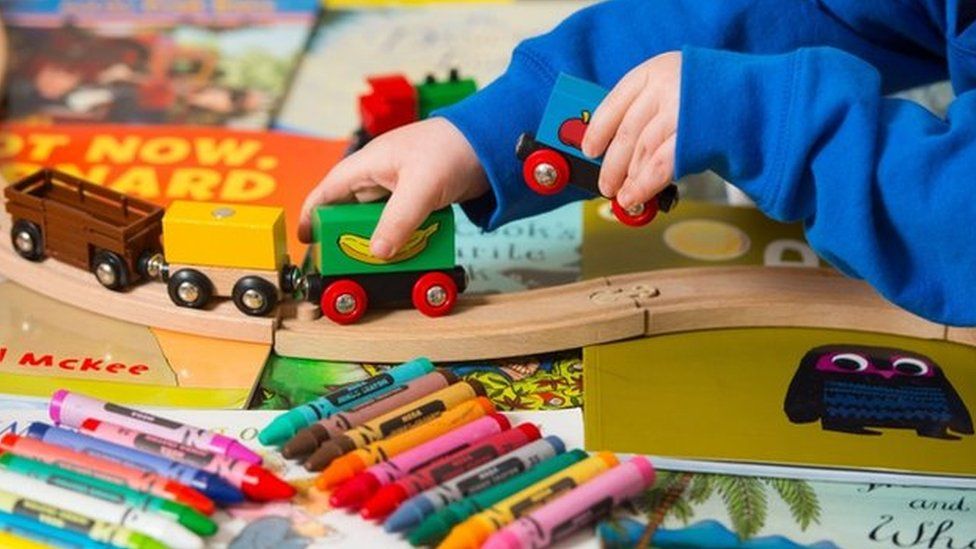Can you be politically active if you have young children?
- Published

Supporters of Jeremy Corbyn have launched an initiative to provide childcare for activists. What help is already available for politically active parents?
Momentum Kids says it will provide "fun, engaging and child-friendly" activities for the children of single parents.
The announcement was mocked widely online, with jokes about "Tiny Trots" and "Child Labour".
Former Labour MP Tom Harris imagined storytelling Momentum-style, which would mean learning about politics "in a fun, progressive, diverse, accessible, tolerant way. But without facts. What do we call facts, children? That's right - elitist constructs."
Suzanne Moore, writing in the Guardian, welcomed the move, saying: "For too long, many of the guys involved in the global class struggle have entirely ignored the more local struggle of who cares for the kids."
The question of who looks after the children while you are fighting the good fight is not just one for women, acknowledges sociology professor Sarah Childs of Bristol University, but it does affect them disproportionately.
She wrote a recent report on making Parliament more accessible to women, but she says the tension between parental and political responsibilities makes itself felt at the grassroots level too.
Tackling the problem will require a shift in how political organisations are financed, she predicts, since "they should think about funding events at a loss or committing a certain proportion of fundraising money to childcare".
But it will also require a change in attitude. She argues parties "should think about holding events where it's OK to bring children - this takes leadership, for someone to take the flak over what will inevitably be met with scepticism".
Women in politics
191 female MPs were elected at the 2015 General Election, 29% of all MPs and a record high.
One-third (35%) of members in the Scottish Parliament are women, compared with 42%)of members of National Assembly for Wales and 28% of Members of the Northern Ireland Assembly.
Women make up 41% of the UK's MEPs.
32% of local authority councillors in England were women, as of 2013.
In Scotland, 24% of councillors are women. Women hold 26% of council seats in Wales. In Northern Ireland 25% of councillors are women.
In 2013, 42% of TUC Congress delegates were women and 45% of TUC General Council members were women.
Source: House of Commons library / TUC audit 2014
Sally Brett, senior policy officer at the TUC, says parents are "more likely to take part in union activities if their employer will pay for the time out of work" and that "rights to reasonable time off but are being squeezed".
She adds that while women are more likely to be union members than men they are "under-represented as activists". Unions are trying to tackle this through adapting the role of shop stewards, mentoring female activists, and developing an equality rep.
Conservative Baroness Jenkin, who runs Women 2 Win, a campaign aimed at boosting her party's number of female MPs, says it can be difficult to get involved at a grassroots level if you don't have a supportive partner.
Part of her party's task, she says, is to get mothers to see standing for office as a progression of other campaigns they might be involved in already, and to raise awareness of help available such as childcare allowances for councillors.
The SNP's Kirsty Blackman points out that at the moment creches are provided at large events such as party conferences but smaller local meetings will not typically have the resources to provide childcare.
When she first became involved in campaigning "it was difficult to go out door-knocking in the evening or to meetings on a Saturday when you want to be at home with your kids".
She says when her daughter was very young she took part in other ways, doing data entry and coordinating volunteers. But, she says, the attitude towards different types of activism needs to shift.
"Office-based duties are not always as visible, and unfortunately the level of campaigning you're seen to be doing is part of how likely you are to be selected to stand as a councillor or MP."
Sam Russell, who stood as the Labour candidate in the London Assembly seat of Bexley and Bromley in May, took advantage of shared parental leave and brought his young son out on the stump with him.
He insists that pounding the streets with a baby in tow was relatively smooth, saying the only adjustments he had to make were "requiring a bit more notice of the timing of meetings, and I would flag up in advance that I had my son with me".
"Most parents know what their child can cope with - and Rowan was very well-behaved. I think the only time he cried was at the count - and that was when we found out I'd lost," he says.
Another campaigning dad, Lib Dem Iain Porter, thinks parties could do more to "set up events with kids in mind - picnics rather than nights in the pub, that sort of thing".
He warns that otherwise local politics "can tend to be dominated by younger people and retirees, and parents' views aren't represented".
Momentum Kids might have been met with some scepticism, but it seems you don't need to be a Corbyn supporter to want better childcare provision in grassroots politics.
- Published19 September 2016
- Published8 July 2016
- Published8 May 2015
- Published5 April 2015